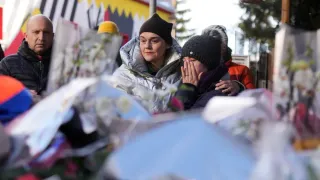December 21, 2015
GLBTQ-DVP Closes After 22 Years; Programs Transfer to Fenway
EDGE null READ TIME: 4 MIN.
On December 31, 2015, the GLBTQ Domestic Violence Project will cease providing direct services and the organization will dissolve in the first months of 2016.
�
"For the past three years, the Board has been focused on long-term sustainability and the impact of this on our service delivery," said Greg DeCenzo, Chair of GLBTQ-DVP's Board of Trustees. "Although we are proud of and grateful for our durable relationships with state and federal funders, our support from individual donors has never been sufficient to provide the funding diversification that small non-profits need to weather the ups and downs in government funding."
�
Over the past 22 years, GLBTQ-DVP has been at the forefront of creating new services for GLBTQ survivors of domestic violence and sexual assault, growing to be a statewide service provider. The organization also worked to bring about responsive public policy and to increase access to culturally competent services.
�
GLBTQ-DVP was founded in 1994 by a gay male survivor who was denied shelter by multiple domestic violence programs while fleeing an attempted murder at the hands of his partner. When the organization started, domestic violence survivors that didn't identify as female were not allowed in domestic violence shelters. Males calling domestic violence programs were assumed to be abusers and most often hung up on. If a gay man or lesbian did get into a shelter, they were often forced back into the closet. Transgender survivors endured invasive questions at intake about their body, and then were still turned away.
�
Over the years, GLBTQ-DVP fought hard to gain access to services and to make policies inclusive. When the organization couldn't change the system fast enough, it created its own services. The organization opened the first GLBTQ-specific 24-hour domestic violence hotline, the first GLBTQ-specific domestic violence residential facility, and one of the first two GLBTQ attorney programs in the country. GLBTQ-DVP was the first to document the prevalence of gay male domestic violence, back when no one was researching the issue.
GLBTQ-DVP succeeded in getting GLBTQ domestic violence into the Massachusetts State Budget, and changed domestic violence language in the state budget from "women and children" to fully inclusive language. GLBTQ-DVP led a groundbreaking discrimination lawsuit, representing a gay male survivor who was denied services at a mainstream domestic violence program. Nationally, the organization helped pass a GLBTQ inclusive Federal Violence Against Women Act with the first ever congressionally passed GLBT-specific federal non-discrimination provision. And the list of firsts goes on.
�
GLBTQ-DVP has accomplished a great deal, all while being a significantly under-resourced organization. Since its inception, the organization has struggled to make ends meet and continually stretched itself to maintain a minimum fund balance to support operations and responsibly enter into government contracts.
In 2013, GLBTQ-DVP had to lay off its Director of Development to avoid a crippling deficit and individual giving continued to decline over the following two years. According to DeCenzo, "A trend is visible, and the organization needs to be in front of it. With our focus on long term stability, the Board prioritized staking out a course to ensure the overwhelming majority of our programming will be here for LGBTQ survivors for many years to come."
�
GLBTQ-DVP is currently working with funders to transfer approximately half of its direct service programming to the Violence Recovery Program of Fenway Health. Specifically, GLBTQ-DVP is working with the Massachusetts Office for Victim Assistance (MOVA) to transfer its 2016 VOCA funded regional advocacy program which provides advocacy services in Western Massachusetts, Cape Cod, and Boston, and the US Office of Violence Against Women to transfer its legal and sexual assault case management programs. It is anticipated that the transfers will be effective January 1, 2016.
The GLBTQ-DVP Board determined that securing its programming with a mission-aligned and financially strong partner, such as Fenway Health, would be the best way to ensure that GLBTQ-DVP's vision is carried into the future and that the programs it created remain strong. Additionally, survivors who access these programs will now have enhanced access to the related supportive services already offered by the Violence Recovery Program and by Fenway Health in general.
The other half of GLBTQ-DVP's direct service programming will be taken on by one or more other organizations, to be determined though a contracting process to be overseen by the state agencies that fund that programming. GLBTQ-DVP has been informed by the state funders that these programs will retain their focus on meeting the needs of LGBTQ survivors. These services include the safe home program and some of GLBTQ-DVP's community-based advocates in Boston.
Only five percent of GLBTQ-DVP's current direct service government contracts will not be immediately re-procured to serve LGBTQ communities. The service impacted by this re-procurement issue is the mental health counseling program. Free mental health services for LGBTQ survivors of violence will continue to be available through the Violence Recovery Program of Fenway Health, with funding from other sources.
"We recognize that we have fulfilled much of our initial advocacy mission, having quite literally changed the way society looks at domestic violence and the inclusive way services are now provided across the commonwealth," noted Curt Rogers, Founding Executive Director of GLBTQ-DVP. "Implementing this plan now, while we are not in acute financial crisis, is the most responsible way to protect the continuity of our programs and the vital services they provide. We look forward to our programs taking root in their new homes and continuing to be invaluable resources for the community."
Survivors who have received services at GLBTQ-DVP and who would like to connect with the advocacy or legal departments should do so before December 31st by calling 800-832-1901. GLBTQ-DVP staff is available to provide supportive referrals and to assist with transferring client files to new service organizations if clients so desire. Client files can also be accessed through the administrative office of GLBTQ-DVP up to February 28, 2016 by calling 617-354-6056.






